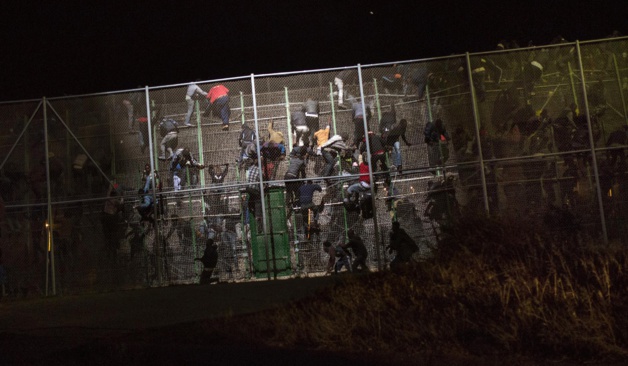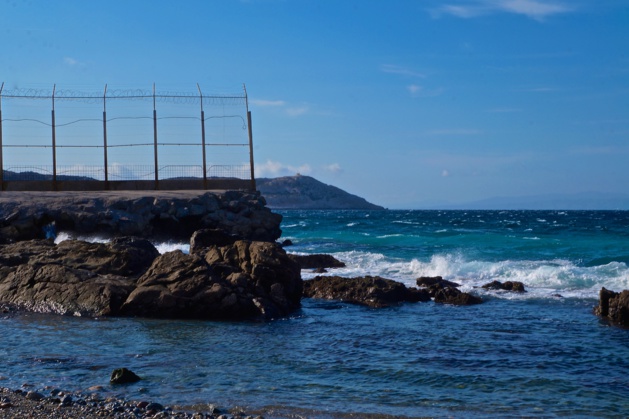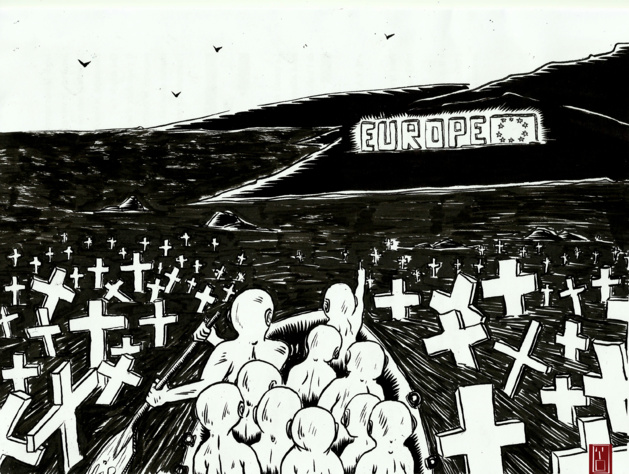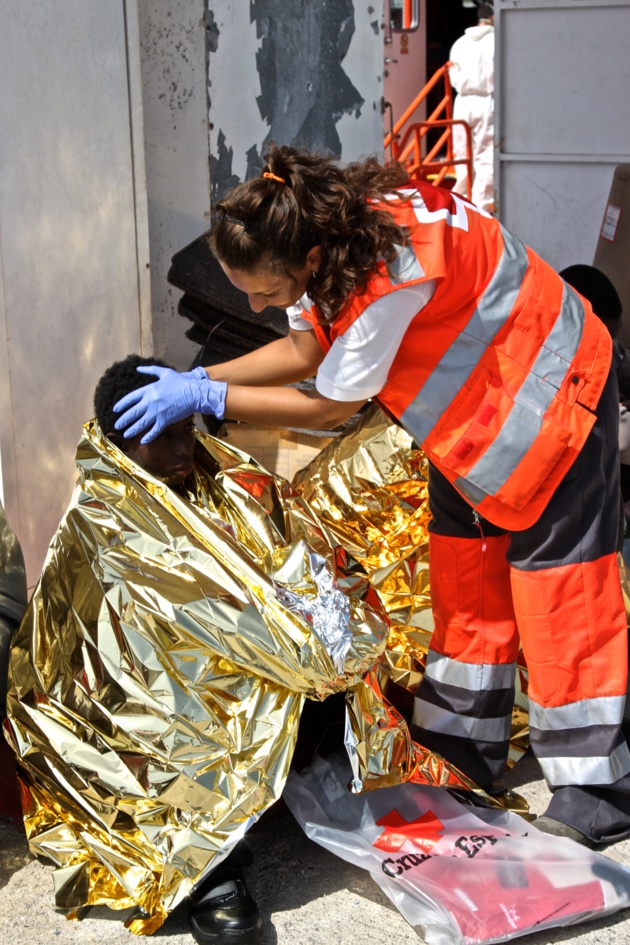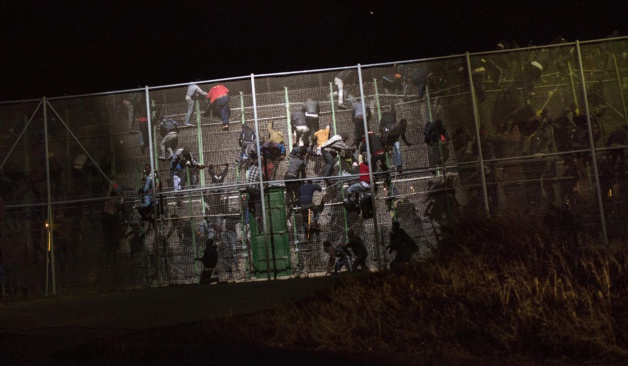
Credits Santi Palacios / AP
Hidden behind the trees stands the CETI, the Centre for Temporary Residence of Immigrants. It overlooks the beach where the debris of oars of survivors still remain. People rarely come out of the crossing unscathed. It is estimated that 6,000 people have died trying to reach Europe via the Strait of Gibraltar, which Germinal Castillo, spokesperson of the local Red Cross, calls the “largest cemetery in Europe.”
The CETI is the structure put in place by the Spanish government to receive the influx of migrants who journey to Ceuta every year. Unlike the CIE (Holding Centres for Foreigners) holding centres on the mainland where migrants have a holding period limit of 40 days, here there is no maximum term of imprisonment. A genuine fortress, the enclosure is surrounded by a ten metre high fence, guarded day and night by the men of the Guardia Civil. The rules there are strict: after 11pm no entry is possible, and the slightest infraction of the rules is punished by temporary expulsion from the centre. In the case of fighting or theft, residents are evicted, in the streets, for a minimum of three days. Originally planned to house 500 people, nearly a thousand have piled in. “We are on average ten per room, sometimes more,’ states Ibrahim, a young Gambian. “It’s really hard to have privacy, one can rarely be alone” he continues.
However, the situation is a lot less catastrophic than previously, before the establishment of the centre. From 1995 to 2000, illegal immigrants were shut up in the camp of Calamocarro, the “camp of shame.” The riots of 1995, where 350 illegal immigrants protested against the inhumane living conditions in Ceuta, violently put down by the police and town inhabitants, forced the authorities to act. Until then, the refugees slept in the streets and begged for a living. Then a few kilometres from the town centre, on an old holiday campsite, a few tents given by the Red Cross were planted. Ideally, the camp set out to receive 500 people, yet there were more than 2,500 of them, tightly packed against each other on a piece of land the size of a football stadium, without running water, without electricity, without food, without hygiene. The attacks by NGOs against the authorities have multiplied, accusing them of violating Human Rights and of harming human dignity.
To face up to the critics, the government initiated the CETI in 2000, and symbolically, the State Delegate of Ceuta came to set fire to the mattresses of Calamocarro. More comfortable, more secure, and certainly more dignified, the centre is not immune from criticisms and from problems, however: insecurity, prostitution, malnutrition. Living inside it are Algerians, Moroccans, Cameroonians, Malians, Guineans, a few Indians and even a Bangladeshi. In the middle of all of that, families try to find their place, even if there are few living in the CETI. The majority are housed in the other centres spread throughout most of the town.
Daily survival
Along the barrier, the migrants press towards the town centre in search of work. Every day, they wander the six kilometres that separate the CETI from the heart of the enclave. Finding work in Ceuta is complicated. For a few euro a day, they help to park cars, wash them, carry the groceries for customers at the supermarket. The work zones are thoroughly organised based on nationality. Parking at the hospital is reserved for the Guineans, at the ports for the Malians, and parking at the entrance of Eroski, the largest supermarket in the enclave, is reserved for the Senegalese. Every day the places are reassigned. The workers change as well: two days per person per week. “That way, everyone can earn a little money.” says Ibrahim. While saying that, he makes large gestures at the cars leaving the parking lot. “I am saying ‘go on, go on’’ he says laughing. “Today I work but it’s the only time this week. Of course we do not earn a lot but at least everyone can benefit.”
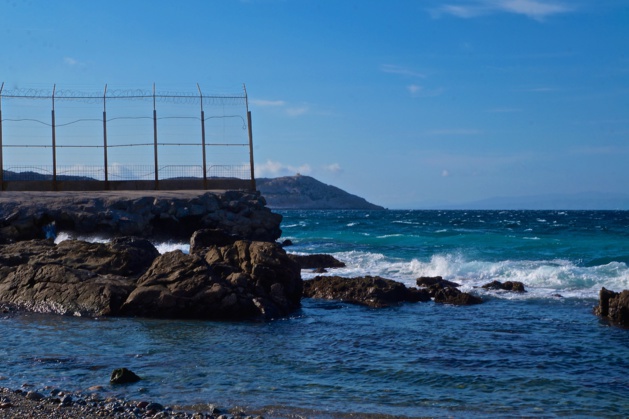
In an unstable position, as they are not Spanish citizens, the only solution left is these precarious jobs. The few euro gathered together primarily enables them to buy phone credit to call the family members still in their country. Costing five euro for a six minute call, not much is left over for additional expenses. Clothes, some foodstuffs, alcohol, cigarettes. These little “luxuries”, nowhere to be found at the CETI, enable people to withstand daily life. Yet it is no flaw on the part of the migrants to look for work, nor on that of the Spanish state to want to reach out to them. In an enclave where the unemployment rate brushes 40%, the locals themselves struggle to find work. The Spanish government offers a work permit to the migrants, given if they seek refuge. Very few make this process, as asking for political asylum implies staying “blocked” in Ceuta for at least one year, while on average migrants don’t stay for more than seven months before going to the Iberian peninsula.
Europe within touching distance
Yarisidibé obtained this famous work permit a short while ago. This Malian, 24 years of age, has been here for 11 months already. He left Mali, at the beginning of 2012, when Tuareg rebels of the MNLA (National Movement for the Liberation of Azawad) and the islamists of AQIM (Al-Qaeda in the Islamic Maghreb) entered Timbuktu. The advance of the jihadists and the northern rebels, along with the French intervention in Mali, pushed a great number of people into fleeing the country. At the worst moment of the crisis, in April 2012, the United Nations High-Commissioner for Refugees took a census of 137,000 Malians having gone to bordering countries, mainly Burkina Faso, Niger and Mauritania. Others took the “opportunity” to try the European adventure.
Before setting sail for Ceuta, Yarisidibé erased every trace of his identity. With the members of his crew, they tore up their papers and threw them in the sea. Tearing up one’s papers is a necessary step for migrants to get into the enclave. This technique enables them to not be identified and therefore limits the likelihood of them being expelled by the Spanish authorities back to their country of origin. Thanks to this, everyone chooses their new nationality in the context of african geopolitics. Following the war in Mali, the Malian population at CETI was, as if by chance, the majority. “I myself am really Malian, but due to the war many present themselves as political refugees when in reality they come from Cameroon or Gambia.” complains Yarisidibé. At the end of 2012, the CETI counted about 85 Malians out of 512 in total, when in normal times, the enclosure accounts for 10 or 15 people of this nationality.
Night begins to fall on Ceuta. In a long line, the migrants reclimb the slope towards the centre. It’s time for dinner and reunions. For others, there is no question of reentering. “The evening is the only time for us to meet up, catch a breath and forget our worries” says Abdulaziz, with a smile on his face. “And especially to drink beer!” adds Fodé. Some are coming home from work but for most it is the end of a long day of wandering. Not far from the CETI, a group of young people is gathering on one of the hills overhanging the beach. They come here every night to have a drink, laugh and rebuild the world. “From there we have the best view of the Great Spain,” explains Fodé, finger pointed towards the horizon. “It’s terrible, we can almost touch it but we are still stuck here.” With Ceuta not being in the Schengen Area, people may enter it but not leave. It is because of this “Schengen bubble” that the migrants do not have free movement.
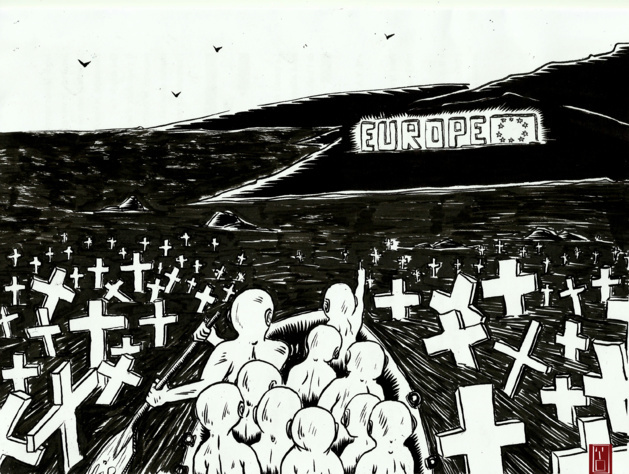
Everyone flees from something in leaving their country of birth. Fodé, 22, confides “In Guinea people wanted to kill me. All because I had been witness to the murder of my best friend. So I had to flee, and took off, I chose Europe.” “We are all here because we all chose Europe” answers Abdulaziz. He left Chad two years ago because “life had become unbearable.” As he underlines, the majority of them left their country on their own, alone, living what everyone calls the “Adventure”.
“We lived like animals before arriving here”
But now they are “forced” to live together here in the centre, waiting for their case to be treated by the local administration. The CETI is, at the end of the day, a large community made up of solitary adventurers. Every day they meet before going to bed. Through necessity, links are forged. Yet, they don’t necessarily know in detail all the stories of the others. The presence of Westerners seems to loosen the tongues, everyone pays attention to their neighbour's story. But most are evasive about the specific and personal reasons for their leaving, and open up more freely in private.
When the subject of the course of their journey comes up, everyone tries to speak at once. There are different routes, one passing through Nigeria and Niger, another through Mali. However, they all journeyed through Algeria and Morocco before arriving here. They also tried to get into Melilla, without success. Regarding the two aforementioned countries, they all agree that “ in Algeria you can find work but no place to sleep. While in Morocco you can find somewhere to sleep, but there is no work.” On the ordeals experienced during their passage through the Maghreb, they are unanimous. “We lived like animals before arriving here.” Ibrahim denounces the determination of the Algerian police to track them down. “There is never a moment’s respite. At night you never sleep soundly.” he says. “The worst is still the suspense we are all living in.” Before moving to Ceuta, we spent whole weeks hidden in the forest.” adds Abdulaziz. Before crossing the border, the migrants wait in the zones where the Moroccan police will not come looking for them.
For Melilla, they gather on a mountain overlooking the border, Gurugu Mountain. For Ceuta, they hide in the forest that lines the enclave, Jebel Musa. In this forest, everyone tries to help, groups form, often based on nationality. They ensure their survival by finding the provisions needed at the crossing. They remain entire weeks in this forest waiting for D-Day. “The earth begins to form a second skin on my body. Washing is a luxury which we can rarely afford.” explains Fodé. Regarding D-Day, again everyone has anecdotes and scars to flaunt. Fodé shows his forearm. “See the marks on my wrist? They are from the barbed wire at Melilla.” Everyone has lost dear friends during the crossing, “barely anybody knows how to swim.” adds Ibrahim. Every year, thousands launch themselves on this suicide mission. Armed with handmade paddles, sitting on small inflatable boats, they set out at eight or nine on their assault on the Mediterranean. To survive these ordeals, many rely on religion. “It was our destiny to make it this far, but for me it will only really be over once I arrive in France.” admits Abdulaziz.
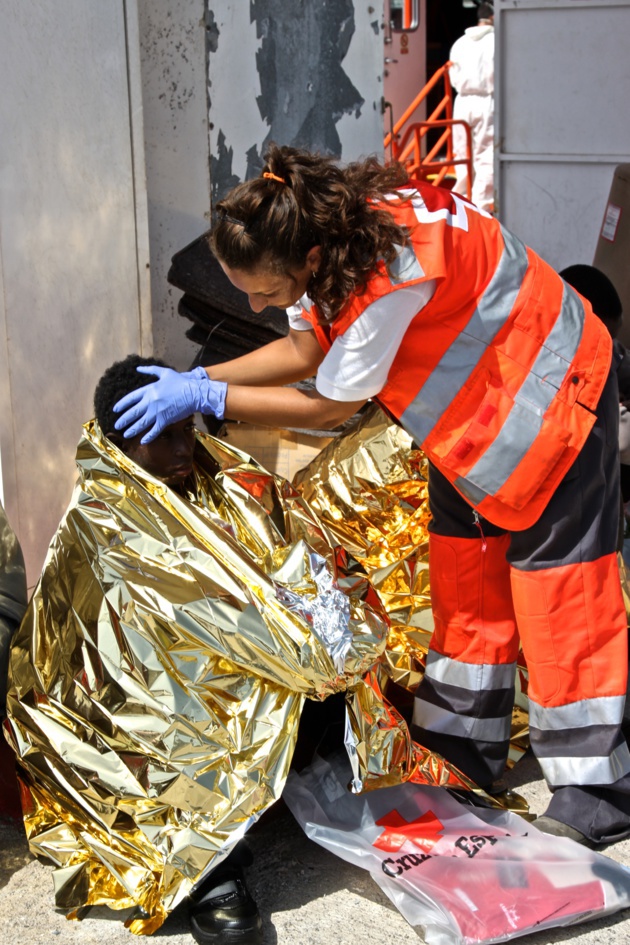
In reality the majority of French speaking migrants have France as their destination. When they speak of Paris, they imagine themselves already in front of the Eiffel Tower. No one among them really knows of the situation for undocumented immigrants in the country. They are lulled by the certainty that Europe is bound to offer them a promising future. Lawson, a Malian, plans to enlist in the French army. Abdulai, another Guinean, has been undergoing accounting studies that he hopes to use on arrival.
Faced with the humanitarian crisis, the associations struggle.
To support the migrants and help them integrate into society, associations have assembled at Ceuta. Maïté opened the San Antonio Centre in 2006. Every day on its premises it welcomes dozens of people, mostly minors, who come to take classes in Spanish, IT, painting or simply to spend a few hours on the centre’s computers to keep in touch with their family members still in their country, or to play ping pong and watch TV.
“What we seek is to recreate a household, for them to clear their heads.” explains Maïté. His center is facing cruel budget cuts. “In the beginning we received funding from the state and the European Union. Then, nothing more, we even had to close a few times in 2012.” Gradually aid has resumed, but not enough and one part of the premise is now abandoned. A clear example, on one of the outer walls, a drawing of Pocahontas remains half finished to due a lack of paint.
For her part, Sister Paola directs a school that gives Spanish classes two times a day. With her, several volunteers try to help the migrants to integrate better. Lawson waits outside the front door. “I have been coming here every day for two months now, it really helps me to exchange with the locals.” Unfortunately, these associative actions remain few and far between. Along with these two centres, the Red Cross is the only NGO present in the enclave.
Excluding the great humanitarian tragedies, foreign media have little interest in the situation there. Journalists focus more on the impact of illegal immigration than humans involved and the stories of each one. Sister Paola is outraged. “I have been attending the same show for decades, with journalists coming to see me, but despite that, nothing changes.”














